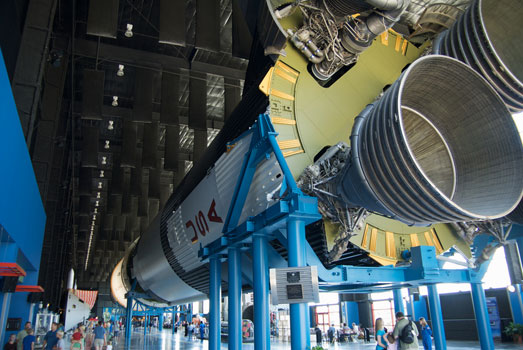DARPA, the Defense Advanced Research Projects Agency, is planning on disbursing a $500,000 grant in November for interstellar starship research.
Though the agency’s plan sounds more like subject matter for a prequel episode of Battlestar Galactica, the agency is hoping starship research will lead to very real advances in science and industry.
The $500,000 award on November 11, 2011 will be the culmination of a year-long project that was designed to make researchers think big about issues with long time horizons in space travel.
DARPA hopes that its brainstorming exercise will ultimately inspire research that will lead to new discoveries in areas such as propulsion, energy storage and life support.
Researchers and hobbyists with a passion for space will be sharing their ideas on DARPA’s 100-year-starship study at the upcoming 100 Year Starship Symposium in Orlando, Florida, which begins September 30.
DARPA has a reputation for funding far-out sounding projects. But nevertheless some have eventually resulted in such staples of everyday life as the internet and our modern personal navigational systems.
In fact, in its solicitation for ideas this June, DARPA referenced Jules Vernes’ classic 1865 novel From Earth To The Moon as an example of how creative and far-out sounding ideas do sometimes end up becoming reality much later on.
Presentations at DARPA’s Starship conference will cover every part of the spectrum of ideas. Some presentations will veer towards the technical. Discussion of different propulsion technologies, and how to produce food for crews on starships are a couple of examples. Other scheduled presentations integrate current hot topics in technology such as video game research, and crowdsourcing.
Still others are more esoteric. One study by the Lifeboat Foundation‘s James Blodgett will focus on the effects of interstellar travel on economic theory. Other presentations are entitled: “Did Jesus Die for Klingons Too?” and “American Sociopolitical Problems Impacting Starship-Project Realization.”
Participants affiliated with the DARPA study include both a variety of independent researchers and a number of long-standing organizations devoted to the hypothetical and practical issues related for deep-space travel.
The Lifeboat Foundation, for example, is devoted to “helping humanity survive existential risks and possible misuse of increasingly powerful technologies” and Project Icarus, focuses on a theoretical design study of fusion-propelled starships.
Project Icarus’ Richard K. Obousy argues that the relatively small $500,000 seed grant does have the potential to propel science forward:
Spin-offs from space-based research programs have typically proven to be extremely fruitful.
For example, The Apollo program, which sent men to the moon lead to spin-offs including: kidney dialysis machines, water purification technology, GPS navigation and more.
It also accelerated the development of miniaturization technologies which lead to the microprocessor industry.
While it’s difficult to predict what sort of products may result from the Starship Study research, they’re likely to be just as diverse and far reaching as those from Apollo.
For DARPA–and the government community at large–the real issue remains what kind of path, if any, the American space program will take, and who will fund it.
While the 100 Year Starship Study might seem like a pet project that appeals to a small but passionate community of scientists and futurists, the past has proved that reaching for the stars often yields ideas and insights that end up finding a useful purpose back here on earth.
Neal Ungerleider is a New York-based journalist who writes for Talking Points Memo on the intersection of technology and policy.






